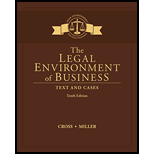
The Legal Environment of Business: Text and Cases (MindTap Course List)
10th Edition
ISBN: 9781305967304
Author: Frank B. Cross, Roger LeRoy Miller
Publisher: Cengage Learning
expand_more
expand_more
format_list_bulleted
Question
Chapter 8, Problem 1IS
Summary Introduction
Case summary: A person R, food buyer for OCF Company, decides to start her own business. She contacts the supplier of OCF company to buy their entire harvest. She also contacts the customers of OCF company, to sell them food at lower prices.
To find: Violation of intellectual property right.
Expert Solution & Answer
Trending nowThis is a popular solution!

Students have asked these similar questions
What are the six sources of data collection and please help to explain the qualitative data collection methods.
What is the thematic analysis?
How to anticipated themes in a research proposal?
Types of gestures include which of the following?
Group of answer choices
motions
accents
emblems
posture
Types of gestures include which of the following?
Group of answer choices
motions
accents
emblems
posture
Chapter 8 Solutions
The Legal Environment of Business: Text and Cases (MindTap Course List)
Knowledge Booster
Similar questions
- Gestures and movement are examples of which type of nonverbals? Group of answer choices appearance proxemics vocalics kinesicsarrow_forwardProblem 1.1 Cyber security is a very costly dimension of doing business for many retailers and their customers who use credit and debit cards. A recent data breach of U.S.-based Home Depot involved some 56 million cardholders. Just to investigate and cover the immediate direct costs of this identity theft amounted to an estimated $62,000,000, of which $27,000,000 was recovered by insurance company payments. This does not include indirect costs, such as, lost future business, costs to banks, and cost to replace cards. If a cyber security vendor had proposed 8 years before the breach that a $10,000,000 investment in a malware detection system could guard the company's computer and payment systems from such a breach, would it have kept up with the rate of inflation estimated at 4% per year?arrow_forwardExplain in detail the principle of Compounding of interest and why is it so important in Finance.arrow_forward
- Hello, please make an excel of this. Show all the cells thanks. some replied with a paper answer thank you I just cant understand the way the did it. Can someone show me all screenshots o fthis problem solved and in excel? i need to solver too for the constraints. I seen multiple times across other platforms that one of the chairs optimal solutions is 0 but they both have to be higher than 1 The Heinrich Company manufactures two types of plastic hangerracks (Foldaways and Straightaways) especially suited for mountingnear clothes dryers. Because permanent press clothing must be hungon hangers immediately after removal from the dryer, these items havebeen especially popular. However, there is some concern that thePreppie movement (popularized by its own handbook) will extinguishpolyester clothing; Heinrich is terribly interested in doing the best withthe resources it has while its products are still in demand. The firsttype of hanger rack, the Foldaway, requires 10 ounces of…arrow_forwardIs crowdfunding a good source for starting a financial planning company? Discuss why or why not it would be right for this.arrow_forwardI need answer typing clear urjent no chatgpt used pls i will give 5 Upvotes.arrow_forward
arrow_back_ios
SEE MORE QUESTIONS
arrow_forward_ios
Recommended textbooks for you
 BUSN 11 Introduction to Business Student EditionBusinessISBN:9781337407137Author:KellyPublisher:Cengage Learning
BUSN 11 Introduction to Business Student EditionBusinessISBN:9781337407137Author:KellyPublisher:Cengage Learning Essentials of Business Communication (MindTap Cou...BusinessISBN:9781337386494Author:Mary Ellen Guffey, Dana LoewyPublisher:Cengage Learning
Essentials of Business Communication (MindTap Cou...BusinessISBN:9781337386494Author:Mary Ellen Guffey, Dana LoewyPublisher:Cengage Learning Accounting Information Systems (14th Edition)BusinessISBN:9780134474021Author:Marshall B. Romney, Paul J. SteinbartPublisher:PEARSON
Accounting Information Systems (14th Edition)BusinessISBN:9780134474021Author:Marshall B. Romney, Paul J. SteinbartPublisher:PEARSON
 International Business: Competing in the Global M...BusinessISBN:9781259929441Author:Charles W. L. Hill Dr, G. Tomas M. HultPublisher:McGraw-Hill Education
International Business: Competing in the Global M...BusinessISBN:9781259929441Author:Charles W. L. Hill Dr, G. Tomas M. HultPublisher:McGraw-Hill Education

BUSN 11 Introduction to Business Student Edition
Business
ISBN:9781337407137
Author:Kelly
Publisher:Cengage Learning

Essentials of Business Communication (MindTap Cou...
Business
ISBN:9781337386494
Author:Mary Ellen Guffey, Dana Loewy
Publisher:Cengage Learning

Accounting Information Systems (14th Edition)
Business
ISBN:9780134474021
Author:Marshall B. Romney, Paul J. Steinbart
Publisher:PEARSON


International Business: Competing in the Global M...
Business
ISBN:9781259929441
Author:Charles W. L. Hill Dr, G. Tomas M. Hult
Publisher:McGraw-Hill Education
